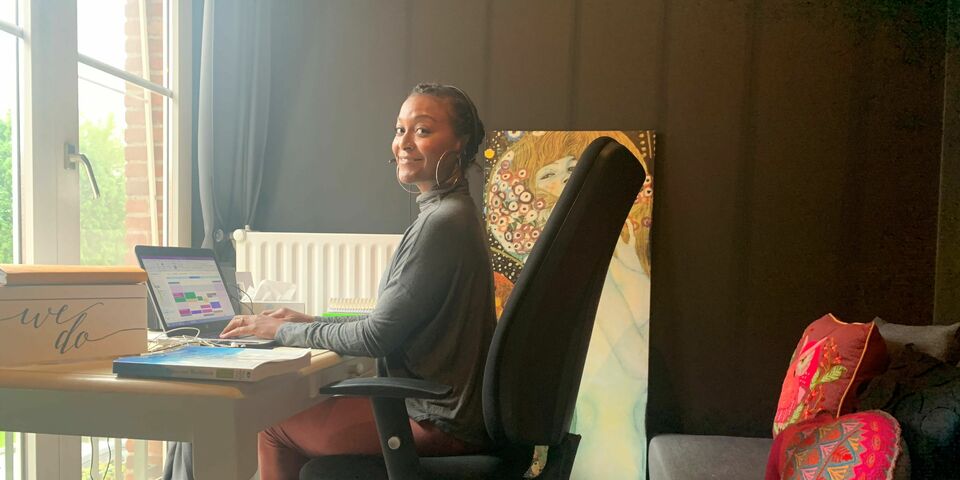Short waiting time for student psychologists
Waiting time for an intake interview with TU/e’s student psychologists has dropped to four calendar days. Education & Student Affairs has deployed extra capacity to quickly council students who seek mental support. Students may face a variety of mental health issues, including fear of failure and concentration problems, as well as worries related to the corona crisis.
Everyone reacts differently to a crisis, and the current corona-related problems are especially unique because they affect each one of us, and because they are new to us all. “It’s possible that students suffer from a stronger sense of social isolation now, from extra stress, from fear or depression, or they could worry more about their future,” students psychologist Rachel Falleyn sums up. “And then there are the daily, practical things. How do I maintain my routine, how can I keep concentrating on the subject I’m studying, how do I stay healthy?” But the emphasis is on the world ‘possible.’ “We didn’t hear many questions like these yet, students appear to be doing well. I myself didn’t get many corona-related questions.”
Low barrier
Nevertheless, Annemarie Urselmann would like to point out that no one should have to feel ashamed to ask for help with dealing with mental issues. “We deployed extra capacity so that we can help everyone quickly,” says the manager Student Facilities at Education & Student Affairs (ESA). “In April, the average waiting time was four calendar days. You can now have an appointment by tomorrow already, and there are plenty of opportunities for intake interviews in May as well.” That’s a significantly shorter waiting time than during last winter.
When you register via TU/e's education guide, you’ll make contact with Skype for business or MS Teams, these are safe for confidential talks, Falleyn assures. “Online talks feel a bit awkward at first, but once you get over that, it becomes easy.” She talks to four or five students a day. After the consult, she sends them home with the usual homework (“I call it thinkwork”). These are exercises like putting thoughts on paper, learning to observe what you’re thinking and feeling, breathing exercises, et cetera. You gain insights into unhelpful thinking patterns, and you learn how to think and act in ways that are helpful.
Lower the bar
Student psychologists try to normalize complaints. Falleyn: “I don’t think it’s strange that you’re suffering from problems, that you don’t know how to deal with this new situation. It’s okay to lower the bar. We shouldn’t think that lowering expectations is the same as failing. During my talks with students, we try to adjust the goals and make them more manageable together.”
She understands that it doesn’t sit well with people when adjusting your goals means setting less ambitious goals. “It seems that we’re somehow programmed to do the best we can and to do as much as possible. This is something I recognize in myself as well. But during a crisis, which is in fact an unsafe situation, you’re allowed to still be yourself. There’s nothing wrong with starting a new hobby, baking pretzels or trying out thirty new yoga positions, but there’s room as well for not doing any of these things. I’s okay to stay in bed for another hour sometimes.”
Social distancing
Social distancing doesn’t have to result in social isolation, Falleyn would like to add. “When a student comes to us with feelings of loneliness, we look at whether there are people in their surroundings they can seek contact with. It can also be very helpful to have recurring contact with someone on a weekly basis, at a fixed moment.” What also helps reduce feelings of loneliness is doing something with others simultaneously, and knowing that about each other. Watching a movie together, in your own room for example.
Rachel Falleyn is the first to acknowledge that she too struggles with the current crisis. Drastically reducing her news consumption proved to be helpful to her. “I only use two news sources, NOS and WHO, which I go to for news once a day, and I don’t consume any news during the weekends.”
Other steps
Those who feel that counselling from student psychologists is still too big a step but who would nevertheless like to talk to someone, can seek advice from a study advisor, the general practitioner, or someone in their own network. Since early April, staff and students at TU/e can also contact Hear Me TU/e, a listening line that was set up by Lara Hofstra, who works at the Student Sports Center. “An excellent initiative,” says Falleyn, “a sympathetic ear is always a good thing, for everyone.”
She notices that not everything is doom and gloom. “I also heard about some deeper connections that were made over the recent period.” But there’s no need to be ashamed when that doesn’t apply to you, the student psychologist says. Nor should you be ashamed when you feel deeply worried. “When you realize that things are starting to become really bad, you can always contact helpline 113. Day and night.”
Do you have suicidal thoughts? Or do you worry about someone else? Immediately call 0900-0113, or chat via www.113.nl. Anonymous, free of charge and 24/7. The site is in Dutch, but calls can be done in English.


Discussion